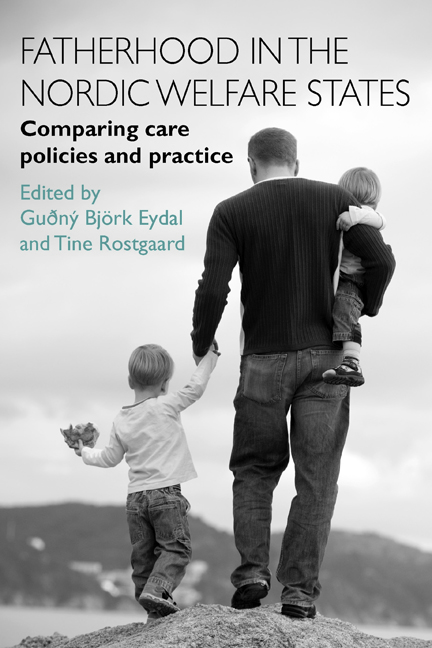Book contents
- Frontmatter
- Contents
- List of tables and figures
- Notes on contributors
- Acknowledgements
- one Introduction
- Theme 1 Fathers, families and family policies
- Theme 2 Fathers in everyday life – culture, work and care
- Theme 3 Constructing fatherhood in different family settings
- Theme 4 Caring fathers and paid parental leave policies
- Theme 5 International reflections on findings
- Conclusions
- Index
ten - Minority ethnic men and fatherhood in a Danish context
Published online by Cambridge University Press: 04 March 2022
- Frontmatter
- Contents
- List of tables and figures
- Notes on contributors
- Acknowledgements
- one Introduction
- Theme 1 Fathers, families and family policies
- Theme 2 Fathers in everyday life – culture, work and care
- Theme 3 Constructing fatherhood in different family settings
- Theme 4 Caring fathers and paid parental leave policies
- Theme 5 International reflections on findings
- Conclusions
- Index
Summary
Introduction
Most of the Nordic research on fatherhood focuses on the norms and practices among the majority population. Due to migration, however, Nordic populations have become increasingly multicultural over the past four decades, rendering investigations of fatherhood practices among minority ethnic groups relevant. In a country such as Denmark, immigrants and their descendants now make up about 10 per cent of the population, with non-Western immigrants and their descendants making up around 6 per cent (Statistics Denmark, 2011).
These non-Western minority ethnic groups are very diverse, and a wide range of different fatherhood practices can be found among them. This chapter provides insights into some of these practices and focuses on the potential challenges of being a father under the circumstances of migration and variations between how different minority ethnic men practise fatherhood. The focus is predominantly on non-Western men from Muslim countries. Empirically, the chapter is primarily based on 24 interviews, 16 of which stem from an investigation of minority ethnic men and masculinity (Jensen and Liversage, 2007), the remaining eight being with divorced Turkish men drawn from a larger interview material of Turkish divorcees in Denmark (Liversage, 2012a, 2012b; Charsley and Liversage, 2013).
The chapter begins with a discussion of the interrelated themes of masculinity, ethnicity and migration, and how migration may bring different models for family life into contact as well as challenge immigrant fathers’ positions in their new country. Second, the chapter discusses fatherhood in cases in which minority ethnic marriages have broken up. Third, it compares the narratives of two men, both raised in Denmark, whose family lives and fathering styles are very different. The main points of this chapter are that minority ethnic fatherhood practices are often circumscribed by challenges of migration and/or their minority ethnic position, which commonly correlates with a low class position. Such low positions may undermine the father's position as breadwinner, which is a central aspect of the complementary gender roles often found in their countries of origin. While some fathers struggle to cope with their life circumstances – and possibly lose contact with their children after a divorce – others are better able to practise fatherhood.
- Type
- Chapter
- Information
- Fatherhood in the Nordic Welfare StatesComparing Care Policies and Practice, pp. 209 - 230Publisher: Bristol University PressPrint publication year: 2014
- 2
- Cited by



